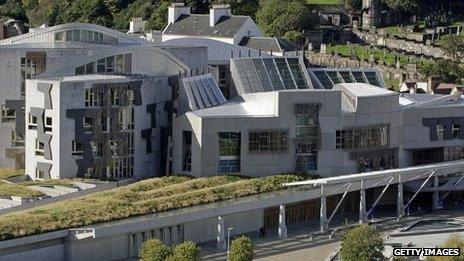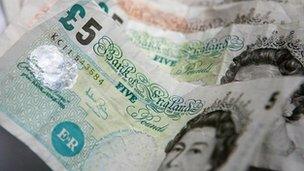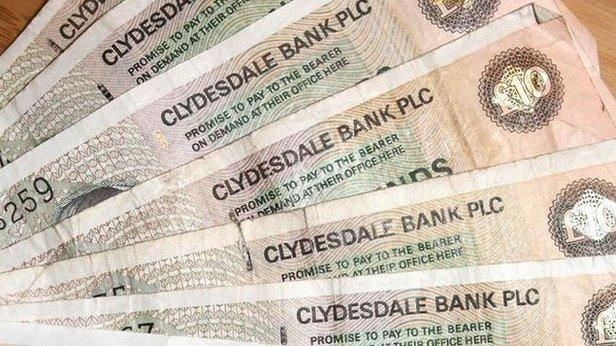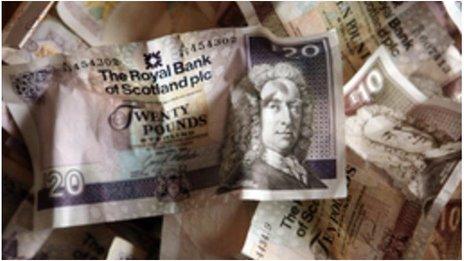Scottish independence: Crunch point for the numbers
- Published

The Scottish government is holding a referendum on independence next year
Wednesday 6 March has been was one of the more significant milestones on the road to the referendum.
We've learned that Scotland's public finances have been less badly off than the rest of the UK.
We've found, through a leaked Scottish government document, that there's cross-party agreement that dependence on offshore oil and gas revenue is no way for a small country to plan its budgets.
We've seen an economists' projection of the future growth path of the Scottish economy. It's not looking good.
Meanwhile, the head of the Institute of Fiscal Studies told MSPs at Holyrood that the spending squeeze has a lot more cutting to do.
Paul Johnson was lecturing the David Hume Institute in Edinburgh on Tuesday, suggesting that the consequence of protecting health, schools and overseas aid in the Whitehall budget is that other budgets will face a squeeze of an average one third over very few years.
He questions whether that's possible, so it may be time to look again at whether the National Health Service should take more of the pain - at Westminster, at Holyrood, or both.
(Incidentally, he also pointed to a widening gap between generations on who is being most affected by higher taxes, lower benefits, less spending and more charging for services. If the under-35s figure out how much the fiscal crunch is being applied more to them than others, don't be surprised to find a generational revolution, or at least more political pressure and voting by younger people.)
We've also heard from the governor of the Bank of England that Scotland's biggest company should be broken up. Sir Mervyn King now tells us he thinks the recovery plan for Royal Bank of Scotland, after four years, is no way to recover.
It makes me wonder if he's noticed that it's already created a bad bank, known as 'non-core', with assets it has been selling and running off on an unprecedented scale, already shrinking its balance sheet by £900m.
Downturn deficits
But back to those public finance numbers. Government Expenditure and Revenue Scotland, or GERS, was started two decades ago by the Conservative government, as a political manoeuvre against devolution, to illustrate how dependent Scotland was on the rest of the UK.

Scotland's share of oil and gas revenue is a bone of contention
It gave ammunition to those who said Scots were feather-bedded with spending. And, with a 9.3% of spending, to 8.3% of population, that relatively higher spend continues.
But the debate has moved on. And facing the question of whether Scotland's public finances could withstand independence, the answer is a qualified "of course Scotland could".
No longer can the pro-union side argue that Treasury discipline ensures public finances are under control. Downturn deficits in Westminster budgets have been sky-high, and remain that way, each one pushing debt upwards.
According to GERS, at 5%, Scotland's deficit remains beyond the 3% level judged to be a maximum under the old eurozone rules. But it's lower than the UK (at 7.9% for 2011-12) and has been falling more rapidly.
While continuing to assume that Scotland can reasonably claim a geographical share of offshore oil and gas, its net fiscal deficit as a share of gross domestic product has fallen by 5.6 percentage points since the peak in 2009-10. The UK deficit has fallen by 3.3 points over that period.
Dipping oil
Of course, the qualification of all this is that it has to be explained with reference to oil revenues. The latest figures, for 2011-12, show a 31% single-year increase in oil coming Scotland's way.
With production dipping faster than expected, the latest estimates for oil revenue won't keep things that way. According to the Office of Budget Responsibility, the £10.3bn contribution from offshore revenue falls to £6.6bn for the current year, then £6.1bn, £5.5bn and £4.5bn by 2015-16.
At Glasgow University's Centre for Public Policy for Regions, they reckon that means the Scottish deficit will rise to 6.5%, slightly lower than the UK's. The year after that, Scotland's deficit is forecast to be 6%, with the UK at 6.1%.
And then, if the Westminster government sticks to its current plans, the UK deficit falls to 5.2% and so on down to 1.6% in 2017-18. The Scottish deficit, however, looks like 5.8%, falling to 3.5% over the same period. So, from 2014-15, the Holyrood finances look like being in worse shape than Westminster's.
Levers of power

Scotland's debt position is highlighted by the latest GERS figures
The nationalist response, articulated by John Swinney, is to say the levers of power can be pulled in such a way as to stimulate higher growth. That ought to mean a rise in revenue, thus driving down the deficit.
The GERS figures also let us look back. The nationalist case is that oil revenue could have been put aside in a trust fund, as Norway did.
The evidence from this Scottish government data comes up with a positive figure. If Scotland had a geographical share of revenue, its average annual surplus between 1980 and last year would have been 0.2% of Gross Domestic Product. Last year, that would have been around £300m. Very useful, and at least positive, but not quite Norwegian in scale.
However, we are where we are. And, according to the Fraser of Allander figures, where we are is heading for a very sluggish economy. It has downgraded its growth forecast for this year from 1.3% (set last November) to 0.9%. For next year, it's down from 2.2% to 1.7%. And its first estimate for 2015 is 1.9%.
That's while unemployment goes up this year and next before falling back in 2015 to its 2012 levels. But it's rising as much as previously feared, having confounded the economists and made them wonder how much they can trust the survey data.
Anaemic growth
None of this suggests a feel-good factor is going to apply at next year's referendum.
The cuts will be biting deeper, growth will remain anaemic. With the job market still tight, it doesn't bode well for household incomes. And, although you probably wouldn't notice it, repair of the public finances will have started falling behind that of Westminster.
That's not to say you can predict how bad economic news would play next year.
You could conclude that bad times are no time to change the constitution. Or you could be sufficiently scunnered by the state of the economy that you conclude an independent Scotland couldn't do any worse.
You can also comment or follow Douglas Fraser on Twitter: @BBCDouglsFraser
- Published6 March 2013

- Published6 March 2013

- Published6 March 2013

- Published6 March 2013
